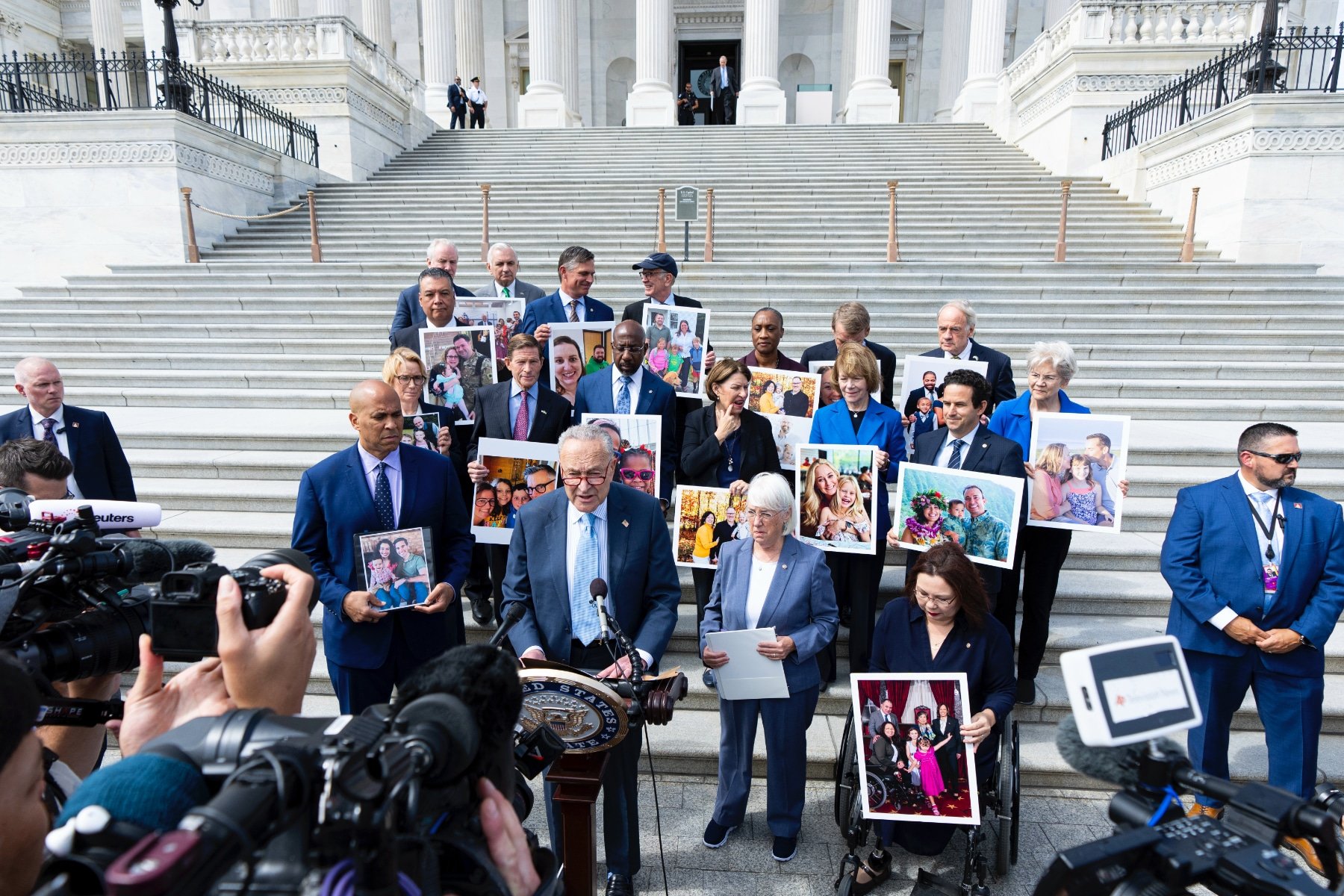Your trusted source for contextualizing abortion and Election 2024 news. Sign up for our daily newsletter.
Senate Democrats on Tuesday tried and failed for the second time in just over three months to advance a bill to protect in vitro fertilization (IVF), highlighting a contrast with Republicans on issues of reproductive health care in the final weeks ahead of the November elections.
All but two Republicans voted against the bill. Sen. JD Vance of Ohio, the running mate of Republican presidential candidate Donald Trump, was not present for the vote; he voted against the bill in June. Among other things, the bill would establish a statutory right to IVF and require employer-sponsored health insurance plans to cover fertility treatments.
Democratic Senate Majority Leader Chuck Schumer brought the IVF bill to the floor for a second vote Tuesday, knowing Republicans would likely block it again, even as the days dwindle for Congress to fund the government before an October recess.
“Here’s what we’re asking our Republican friends: Do you support American families’ access to in vitro fertilization or not?” Schumer said ahead of the vote. “For many Americans, starting a family is one of the greatest joys there is, yet millions of Americans struggle with the defeating battle of infertility every single year. Sadly, as we’ve learned this year, access to IVF can no longer be taken for granted.”
November will be the first presidential election since the Supreme Court’s June 2022 decision in Dobbs v. Jackson Women’s Health Organization that ended the federal right to abortion. Unpopular abortion bans passed by Republican state legislatures — and their consequences — are top-of-mind for critical blocs of the electorate, and the potential impacts of the end of abortion rights on IVF were recently highlighted by a case in Alabama.
Fourteen states have full abortion bans in place, and four more cut off abortion at six weeks, before many people know they are pregnant. The conservative bloc on the court that overturned Roe v. Wade included three justices nominated by Trump.
Dobbs also opened the door to the anti-abortion movement’s longtime goal of establishing fetal personhood, or redefining fetuses and even embryos or zygotes as a person with legal rights. IVF is a medical process in which an egg is fertilized in a lab and later implanted in the uterus and often creates more embryos than a patient intends to use. Fetal personhood creates a legal environment in which abortions or discarding frozen embryos could be considered a crime, like homicide.
At least 11 states have either a specific law or language within other laws establishing some level of fetal personhood, according to the advocacy group Pregnancy Justice. Earlier this year, the Alabama Supreme Court cited fetal personhood language within state statutes to find that frozen embryos were people, temporarily halting the procedure in the state.
The GOP-controlled Alabama legislature and Republican Gov. Kay Ivey rushed to restart IVF by enacting a bill that shields IVF providers from criminal liability. Democrats there said it was a quick fix that did not address the underlying issue. Many physicians agreed that the Pandora’s box of fetal personhood laws would make it difficult if not impossible to ensure long-term protections for IVF and other forms of assisted reproductive technologies both in Alabama and across the country.
Recent polling from The 19th and Survey Monkey showed that a majority of Americans do not believe that a fetus should have the same legal rights as a person and nearly half of those polled think the government should protect access to IVF. Meanwhile, more than 80 percent of Americans believe IVF is “morally acceptable,” according to Gallup polling from over the summer.
The legislation that the Senate voted on Tuesday was introduced in June by Democratic Sen. Tammy Duckworth of Illinois, with 48 total co-sponsors, or nearly all of the senators who caucus with the Democrats. In addition to establishing a right to IVF and addressing insurance coverage of fertility treatments, the bill would authorize individuals serving in the U.S. military to freeze embryos ahead of deployment or after an injury, improve military access more generally and mandate that health insurance plans that participate in the Federal Employees Health Benefit Program cover other assisted reproductive technologies, along with IVF.
When the Senate first voted on the legislation in June, Republicans said the process was too rushed and that Democrats were using IVF as a “scare tactic” ahead of the November elections, when a third of Senate seats and all 435 seats in the House of Representatives will be on ballots.
Republicans tried to head off the June vote by holding one of their own on legislation introduced by GOP Sens. Katie Britt of Alabama and Ted Cruz of Texas. It would have prohibited states that receive federal Medicaid funding from banning IVF but did not address potential legal liability faced by IVF providers or patients for destroying unused embryos. Democratic Sen. Patty Murry blocked the legislation and said at the time the Republican bill was a “PR tool, plain and simple.”
“The only reason IVF is in jeopardy is because Donald Trump overturned Roe, something he has never stopped bragging about. Now, Republicans in Congress are playing the same game, posturing as pro-family, while voting down this bill to help families grow; pretending to support IVF, while championing fetal personhood,” Murray said ahead of Tuesday’s vote.
IVF has only become more salient as a political issue in the months since the Senate first voted on the Democratic bill to protect it.
The Republican National Committee approved a policy platform ahead of its convention that said the party supports state-level fetal personhood efforts, while also “supporting mothers and policies that advance Prenatal Care, access to Birth Control, and IVF.” It did not address the legal contradiction that fetal personhood laws are widely interpreted as prohibiting IVF in practice. Trump, in a surprise twist last month, said that if elected he would ensure the government or health insurance companies fully pay for people’s IVF treatments. He did not provide details about how this would work or how his administration would pay for it or address the fact that his party’s platform imperils IVF.
-
Previous Coverage:
-
Previous Coverage: Senate Republicans block Democratic bill to protect IVF
The issue came up during the presidential debate earlier this month between Trump and Vice President Kamala Harris, who in the months since the first IVF vote replaced President Joe Biden at the top of the Democratic ticket. Harris framed abortion, IVF and other types of reproductive health care as basic freedoms long enjoyed by Americans that need to be protected. Trump said that he was a “leader on IVF, which is fertilization, the IVF. I have been a leader,” noting he criticized the Alabama Supreme Court ruling. However, he did not provide any further details about his plan to protect IVF and instead reiterated disproven falsehoods about Democratic abortion policies.
Democratic Sen. Debbie Stabenow of Michigan said during a Harris campaign call ahead of Tuesday’s vote that she had “not had any outreach from Republican colleagues” in the months between the first vote and the second to negotiate on IVF legislation. “When Donald Trump says now that he wants all this to be free, and he’s offering all these things, was he on the phone last night? Is he on the phone right now? The vote is this afternoon. Is he telling Sen. [Mitch] McConnell that he wants all the Republicans to vote ‘yes’ on this because he now supports IVF?” Stabenow asked.
In a news conference in front of the Capitol ahead of the vote, Schumer, Murray, Duckworth and Sen. Cory Booker of New Jersey, stood holding photos of constituents’ children that had been conceived using IVF — in Duckworth’s case, it was her own two daughters.
“This morning, I got to pack their lunch boxes, and it sounds mundane … but when I spend just a second thinking about it, even that kind of everyday moment with my girls isn’t really mundane at all: It’s a miracle. Because after 10 years of struggling with infertility, after being wounded in combat, I was only able to have my girls through the miracle of IVF,” said Duckworth, a military veteran.
“The only reason there was PB&J for me to make this morning, and the only reason there is tiny sneakers for me to Velcro, is because after I came home from war, I had the freedom to seek the health care I needed to make my dream of going from ‘Tammy’ to ‘mommy’ a reality,” she added.





